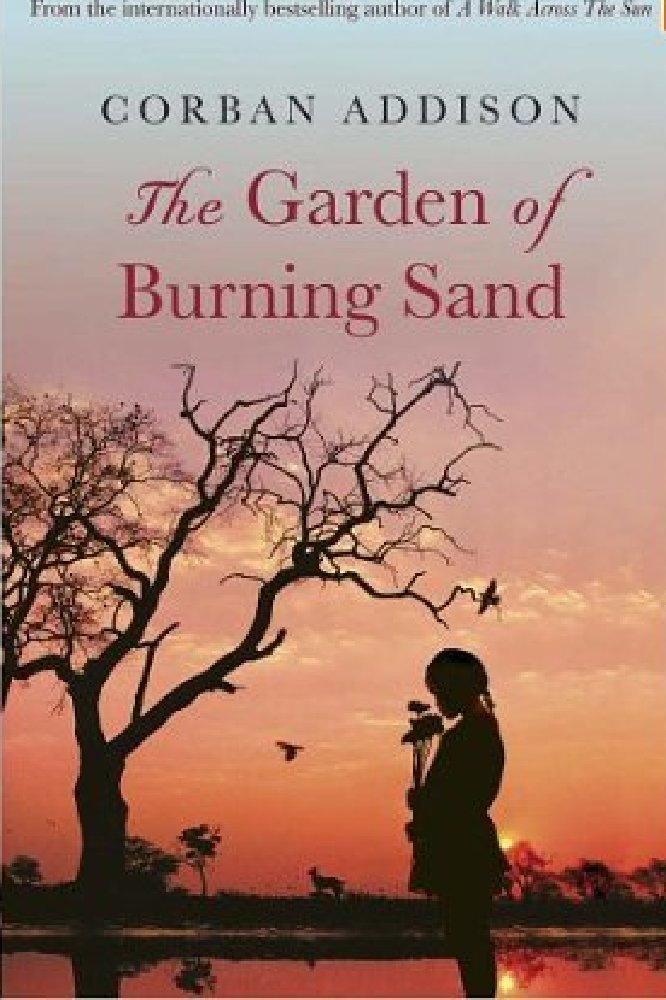
The Garden of Burning Sand
The Garden of Burning Sand is both a continuation and an extension of the themes I developed in A Walk Across the Sun. It is a page-turner set in exotic locales (this time Southern Africa); it weaves together the relational strands of romance and family; and it addresses a number of human rights issues--above all gender-based violence. Nick Kristof at the New York Times has called the oppression of women worldwide the great moral challenge of the 21st century. The Garden of Burning Sand puts a human face on that challenge and elucidates the courage it will take for our society to defeat it.
The character of Zoe Flemming and Thomas Clarke (A Walk Across the Sun) are both in law, as were you, so why do you like to have this influence in your books?
I'm convinced that justice is essential to peace and flourishing in human society. Where injustice thrives, so does violence and poverty. In my travels, I've experienced the reality of injustice first-hand, and I've also witnessed the power of the law--in the hands of courageous lawyers and judges--to overcome it. I'm interested in telling stories that expose injustice in our global society and that depict ordinary human beings triumphing over it.
Your first book, A Walk Across the Sun has sold over 50,000 copies, so to what extent has this given you a boost as a new writer?
The success I've had with A Walk Across the Sun has given me a great start as a novelist and confirmed my instinct that people want to read stories that enlighten as well as entertain. I hope to build on that success with The Garden of Burning Sand and future books.
You have an abiding interest in international human rights, so when did your passion for this begin?
I've been passionate about justice for as long as I can remember. When I was a kid, I was bothered by wrongs I saw on the schoolyard, in the classroom, and in the sporting world. When I began to travel and saw the grievous effects of poverty, discrimination, and oppression, I started to care about the deeper forms of injustice in human society. Law school cemented this concern and storytelling gave me a unique outlet for it.
You are a supporter of numerous causes such as the abolition of modern slavery, please can you tell us about your role in this.
As I writer of human rights stories, I see myself as wearing two complimentary hats: author and advocate. I am concerned not only to write compelling human stories that expose injustice in the world, but I'm also concerned to use my platform and my voice to effectuate positive change. My background in law gives me credibility in this pursuit, and the success of my writing has opened doors for me (and my wife) to participate in advocacy work. We are committed to the cause of justice, and we are hopeful to expand this commitment as my writing career progresses.
The book has been compared to a Grisham Thriller, so is he someone you aspire to?
John Grisham is a great writer and a genuinely decent human being. I read "A Time to Kill" in my early teens, and I was captivated by the story and stirred by the power of fiction to expose injustice. If I have even a small fraction of the success he has had in capturing an audience with stories that speak truth to power, I will consider myself blessed.
If you could have dinner with any author who would it be and why?
I'd probably pick Fareed Zakaria, the foreign affairs analyst who wrote "The Post-American World." His insights into 21st century global society are learned, brilliant, and refreshingly balanced. I'd ask a lot of questions and let him do most of the talking.
What is your writing process?
I approach my writing like I used to approach preparing a complex civil lawsuit. I'm a stickler for research, and I'm also highly systematic. I read everything I can get my hands on about a topic, I travel to the places my characters will go, I interview people who have first-hand knowledge of things I need to understand, and I compile my notes in a document that usually ends up being about as long as the book I write. As my research progresses, I build an outline for the story in my head, and I sketch out my characters until they start to live and breathe for me. When I write the first page, I know who I'm writing about and where I'm going with the story. I leave room for epiphany, but most of the inspiration I rely upon comes out in the research and story-building process.
What is next for you?
I'm working on the research for my third novel now. It's the most ambitious project I've undertaken to date, and it's been a fascinating ride, both in the travel I'm doing and the interviews I've done. I'm keeping the plot line close to the vest because I'd rather focus attention on the launch of The Garden of Burning Sand. But when the time comes, I hope my readers will enjoy it as much as I am enjoying it.

